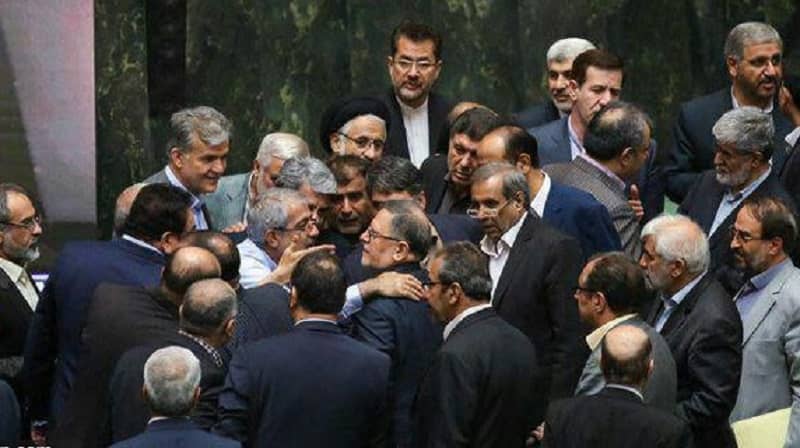Facebook
Twitter
LinkedIn
Pinterest
Reddit
Email
Print
 File photo- fighting in Iran’s regime Parliament
File photo- fighting in Iran’s regime Parliament
Two-minute read
A sweeping pressure campaign orchestrated by the Iranian regime’s Supreme Leader Ali Khamenei is targeting the revisionist faction—a coalition demanding sweeping policy change, including on nuclear enrichment, regional military involvement, internal restrictions, and the IRGC’s powerful role—to retract their proposals. Behind the scenes, Khamenei has marshaled key institutions—the Armed Forces General Staff, the judiciary under Chief Justice Gholamhossein Mohseni Ejei, and hardline media outlets controlled by his office such as Kayhan, alongside IRGC-run outlets, to amplify a unified message of intimidation and suppression.
On August 24, 2025, Khamenei issued a public rebuke of any engagement with Washington, dismissing such overtures as “superficial” and warning they undermine ideological coherence.
One day later, on August 25, the Armed Forces General Staff released a rare political statement: accusing the U.S. and Israel of seeking to sow division within Iran in the aftermath of the 12-day Gaza war and condemning “multi-voiced messaging” as an act that jeopardizes “national cohesion.”
Power Struggles Intensify in #Tehran as Khamenei Faces Fracturing Factionshttps://t.co/l2CYP2iEzd
— NCRI-FAC (@iran_policy) August 24, 2025
Judiciary Delivers Ultimatum
On August 25, Chief Justice Ejei issued a legal ultimatum to the so-called “Reform Statement” which had called for:
Direct negotiations with the U.S. to lift sanctions.
Voluntary suspension of uranium enrichment under IAEA oversight.
Withdrawal of the military and IRGC from politics, the economy, and culture.
Free elections without Guardian Council vetting.
Amnesty for political prisoners and lifting restrictions on so-called opposition leaders (a reference to Mehdi Karoubi and Mir-Hossein Mousavi)
Regional diplomacy to reduce tensions and rebuild Iran’s global standing.
Ejei demanded an immediate retraction under threat of prosecution: “Those who issued this statement in line with the enemy’s agenda must repent; otherwise, the Tehran prosecutor will act.”
However, the revisionist faction leaders pushed back. Azar Mansouri, head of the Reform Front, stated: “Our statement doesn’t echo the enemy’s voice—it represents silenced Iranians who fear for the country’s future.”
Factional Infighting Over “Nuclear Compromise” Exposes #Iranian Regime’s Deep Crisishttps://t.co/bYCijKZyGm
— NCRI-FAC (@iran_policy) August 25, 2025
Media Machinery Goes into Overdrive
On August 25, the Kayhan Daily, overseen directly by Khamenei’s office, tagged the reformists “traitors,” calling for immediate legal and political retaliation, warning that mere apologies would be a concession to foreign “enemies.”
Simultaneously, IRGC-run media—including Fars News Agency, Tasnim, Owj, and Nasim—echoed the same line, accusing revisionists of betraying national unity and demanding a crackdown to defend the revolutionary order.
Notably, even figures like the regime’s president Masoud Pezeshkian, who called for a reconsideration of Tehran’s nuclear path, found themselves targeted—IRGC-aligned outlets suggested he might meet a “Banisadr-like fate.” Meanwhile, former officials like Hassan Rouhani and Mohammad Javad Zarif also came under fire for using their platform for calling on Khamenei to back down.
#Iran Faces Mounting Crisis: Snapback Mechanism Threats, Nationwide Military Alert, and Fear of Uprisinghttps://t.co/RM2d5Gbltz
— NCRI-FAC (@iran_policy) August 26, 2025
Khamenei’s Tightrope Walk
Khamenei now faces a deepening existential dilemma. The so-called “reformist” faction is not seeking democratic transformation but rather pressing for tactical adjustments to preserve the system that has sustained them for decades. Their proposals — from limited talks with Washington to curbing some military overreach — directly touch the strategic pillars of Khamenei’s authority, forcing an internal clash within the ruling elite.
What sets this confrontation apart from previous episodes is not newfound courage but growing desperation. These factions recognize that Khamenei’s hardline course risks greater international isolation, escalating economic collapse, and a perfect storm of a nationwide uprising. Their pushback stems less from principle than from fear that the regime’s survival is at stake — a defensive maneuver aimed at saving the system, not changing it.
